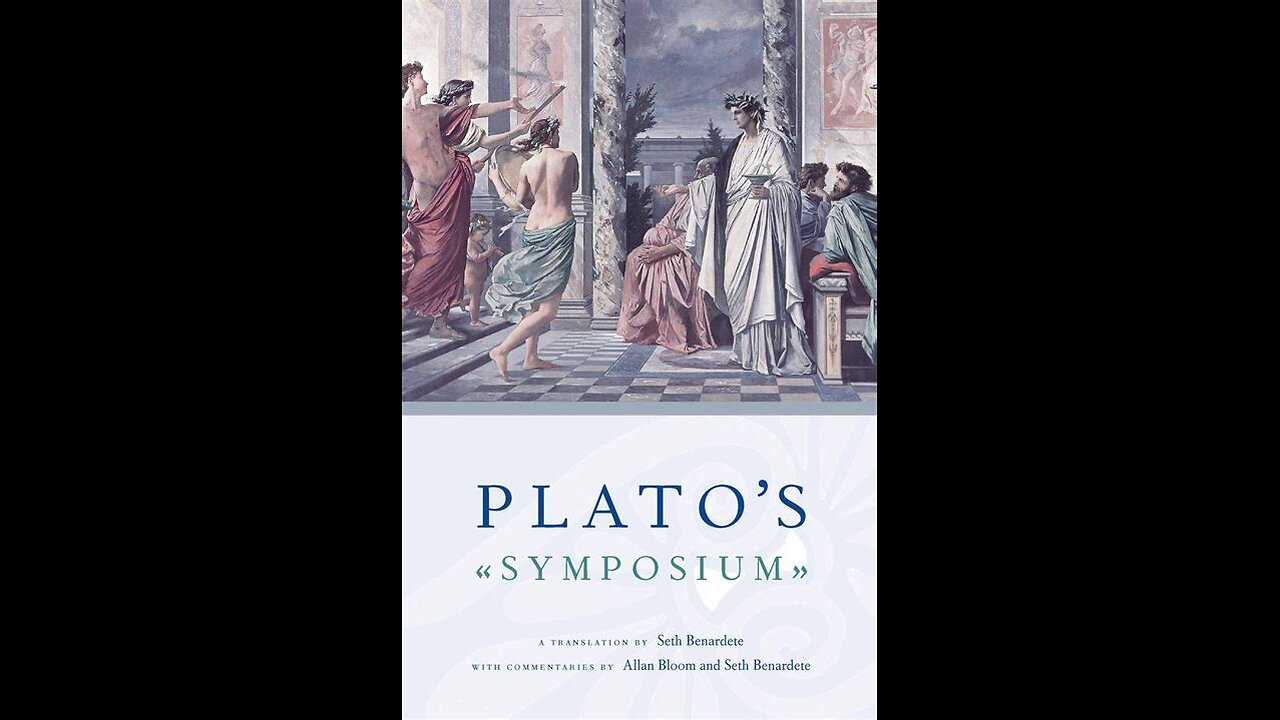Premium Only Content

The Symposium by Plato | Summary and Critique
Buy Here: https://amzn.to/40nxC0h
"In Plato's philosophical masterpiece, ""The Symposium,"" readers are invited to join a lively gathering of intellectuals and philosophers as they engage in a series of speeches on the topic of love.
The dialogue takes place at a symposium, a social gathering in ancient Greece where guests would engage in intellectual discussions, drinking, and entertainment. Each participant delivers a speech praising the nature and essence of love, exploring its various dimensions and expressions.
The speeches in ""The Symposium"" present different perspectives on love, ranging from the physical and sensual to the intellectual and spiritual. Phaedrus begins the speeches, extolling the virtues of love and its power to inspire courage and heroism. Pausanias follows with a more nuanced view, distinguishing between noble and base forms of love. Eryximachus takes a broader approach, examining the role of love in maintaining harmony and balance in the natural world.
Aristophanes injects a touch of humor into the dialogue, presenting the mythological account of human beings originally having two bodies, which were split apart by the gods. According to Aristophanes, love is the desire to reunite with our missing halves, forming a complete and harmonious whole.
Agathon delivers an eloquent and poetic speech, emphasizing the beauty and grace of love. He portrays love as a divine force that brings harmony, joy, and inspiration to the world. Socrates, known for his Socratic method of questioning, challenges the previous speeches, seeking a deeper understanding of love. He explores the teachings of Diotima, who presents love as a ladder of ascent, leading from the physical to the intellectual and ultimately to the contemplation of the eternal.
""The Symposium"" concludes with Alcibiades' drunken and emotionally charged speech, confessing his love for Socrates and highlighting the profound impact Socrates has had on his life. Alcibiades portrays Socrates as the embodiment of wisdom and virtue, revealing the transformative power of love in their relationship.
Critics laud ""The Symposium"" as a masterful exploration of the nature of love and desire. They appreciate Plato's skill in presenting multiple perspectives and engaging in philosophical discourse through vibrant dialogue. The work is admired for its profound insights into human nature, the complexities of love, and the intertwining of the physical and spiritual realms.
Critiques of the dialogue revolve around the lack of female voices in the symposium, with some readers highlighting the absence of diverse perspectives and experiences. Additionally, some argue that the speeches presented are idealized and fail to capture the full complexity and messiness of love in real-life relationships.
However, ""The Symposium"" remains an influential and enduring work, inspiring countless discussions on love, beauty, and the nature of reality. Its exploration of the various facets of love continues to captivate readers, inviting them to reflect on the profound depths of human connection and the eternal quest for wisdom and understanding."
-
 1:31:32
1:31:32
BEK TV
10 hours agoThe Truth About Autism, Vaccines, and Parasites They Don’t Want You to Know - Dr. Jason Dean
10.4K1 -
 1:58:41
1:58:41
BEK TV
1 day agoTrent Loos in the Morning 4/25/2025
22.5K -
 25:12
25:12
JasminLaine
19 hours agoMark Carney Gets GRILLED By Reporter—Lies Finally Get Fact-Checked… PUBLICLY
33.3K40 -
 11:46
11:46
Tactical Considerations
16 hours ago $4.80 earnedKimber CDS9 The Micro 1911 That Seems To Have It All
38.3K5 -
 15:48
15:48
IsaacButterfield
1 day ago $3.45 earnedWoke Lunatic ATTACKS My 2 Year Old Son!!
54.8K33 -
 55:00
55:00
The Hannah Faulkner Show
23 hours ago $3.44 earnedKLAUS SCHWAB RESIGNS & A NEW POPE with Mike Crispi | The Hannah Faulkner Show
46.4K10 -
 36:50
36:50
Uncommon Sense In Current Times
15 hours ago $1.28 earnedHomicide Detective Finds God While Investigating True Crime | J. Warner Wallace
31.7K16 -
 1:00:51
1:00:51
Trumpet Daily
22 hours ago $4.53 earnedAmerica’s Shameful Foreign Policy - Trumpet Daily | Apr. 24, 2025
40.7K14 -
 17:18
17:18
VSOGunChannel
18 hours ago $1.01 earnedDNT HYDRA- A Thermal Sight You Can Actually Afford
38.7K7 -
 10:10
10:10
Mrgunsngear
16 hours ago $8.32 earnedNew Trijicon MRO SD - The Best American Made Red Dot Optic?
76.3K17